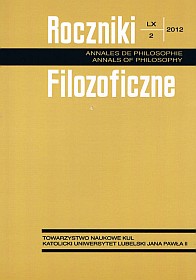The Three Kinds of Freedom according to John Locke
Abstract
The article presents the problem of freedom in Locke’s metaphysics and epistemology. The analysis of the source text shows, that he uses the concept of freedom in the three different meanings. The first one is voluntary that can be described as the power to do what the agent wants. Next is freedom of action which is the ability to do what the agent wants to do and also to stop doing this whenever he wants to. The last one is freedom of will that means the power to refrain from performing an action. After that the agent can think about his decision and make it more thoughtful and accurate.
In order to characterize these kinds of freedom it is necessary to answer to following questions: Which kind of these three types of freedom presented by John Locke is compatible with determinism? And the second question is: what kind of freedom relates to moral responsibility?
The final analysis shows that only voluntary can coexist with determinism. Therefore Locke should not be interpreted as compatibilist for all of three kinds of freedom in his theory. Answering to the second question, moral responsibility is connected with every kind of freedom. In each case an agent has the free choice and can realize his own desires.
References
Bartnik Cz.: Arminianizm, [w:] Encyklopedia Katolicka, t. 1, Lublin: TN KUL 1989, kol. 936-937.
Frankfurt H.G.: Wolność woli i pojęcie osoby, [w:] Filozofia moralności: postanowienie i odpowiedzialność moralna. Fragmenty filozofii analitycznej, t. 4, red. J. Hołówka, Warszawa: Fundacja Aletheia 1997, s. 21-39.
Harris J.A.: Of Liberty and Necessity. The Free Will Debate in Eighteenth-Century British Philosophy, Oxford: Oxford University Press 2005.
Lowe E.J.: Agency and Will, [w:] tenże, Locke, London and New York: Routledge, Taylor & Francis Group 2005, s. 128-159.
O’Connor D.J.: John Locke. A Critical Introduction to the Great Seventeent-Century Empirist Who Founded the British Philosophical Tradition, Great Britain: Pengiun Books 1952.
Sleigh R., jr., Chappell V., Della Rocca M.: Will, Action and Moral Philosophy, [w:] The Cambridge History of Seventeenth-Century Philosophy, ed. D. Garber, M. Ayers, vol. II, Cambridge: The Press Syndicate of the University of Cambridge 1998, s. 1244-1256.
Warfield T.A.: Kompatybilizm i inkompatybilizm: wybrane argumenty, „Roczniki Filozoficzne” 54 (2006), nr 1, s. 217-239.
Yaffe G.: Liberty Worth the Name. Locke on Free Agency, New Jersey: Princeton University Press 2000.
Copyright (c) 2012 Roczniki Filozoficzne

This work is licensed under a Creative Commons Attribution-NonCommercial-NoDerivatives 4.0 International License.





